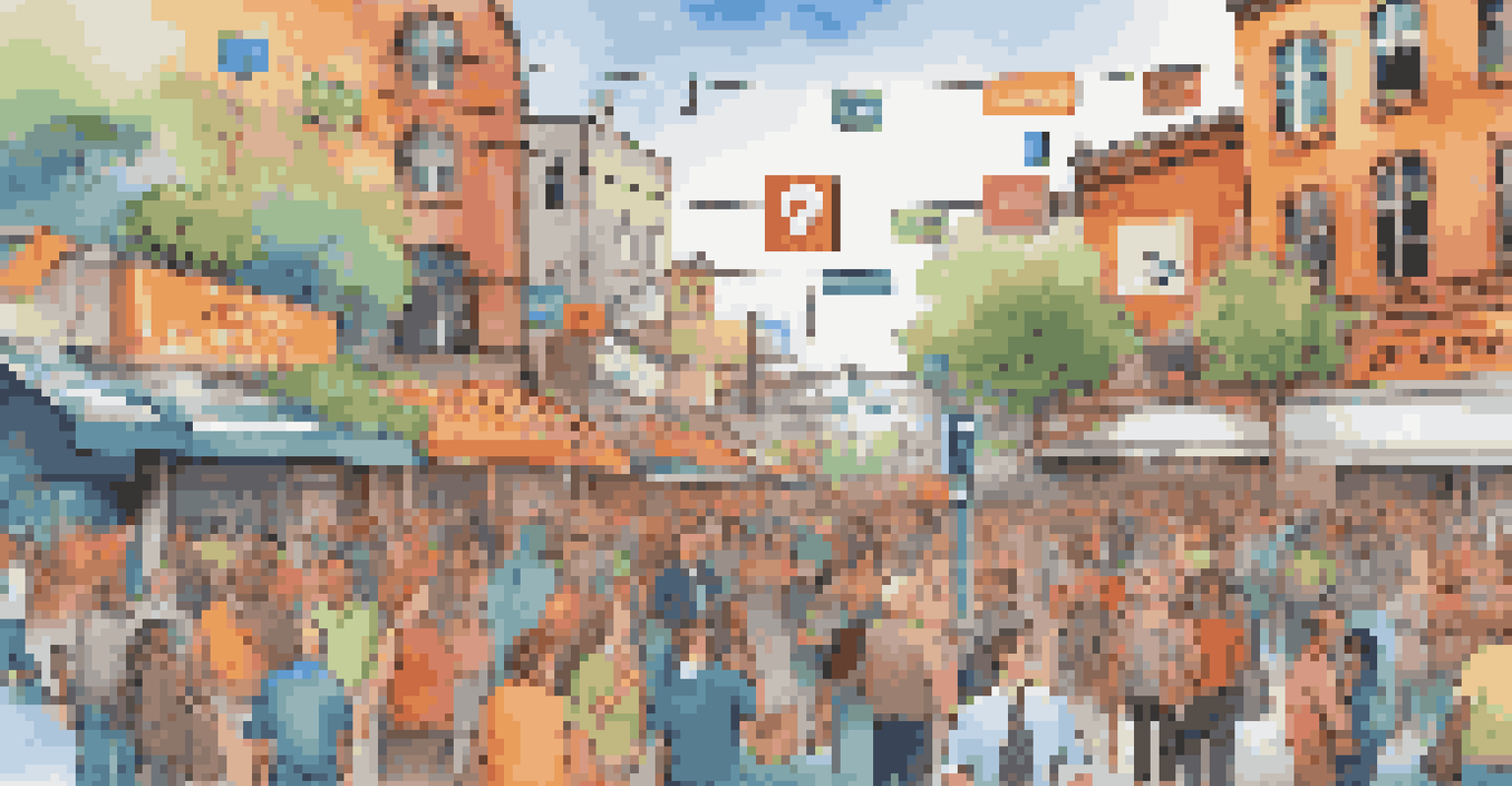Social Media's Impact on Building Professional Learning Networks

Understanding Professional Learning Networks (PLNs)
Professional Learning Networks, or PLNs, are groups of individuals who share knowledge and resources to enhance their professional skills. These networks often extend beyond traditional boundaries, allowing educators and professionals to connect globally. By utilizing various platforms, individuals can collaborate and learn from one another, enriching their personal and professional growth.
The beautiful thing about learning is that no one can take it away from you.
Imagine PLNs as a virtual garden where each member plants seeds of knowledge and nurtures them together. This collective effort results in a thriving ecosystem of ideas and support. The beauty of PLNs lies in their diversity; members come from different backgrounds and experiences, contributing unique perspectives that enhance learning.
In today's fast-paced world, staying updated and connected can be challenging. PLNs provide a structured way to share insights, resources, and best practices, making it easier for professionals to adapt and evolve in their fields. This sense of community fosters a culture of continuous learning and collaboration.
The Rise of Social Media in Professional Development
Social media has revolutionized the way professionals engage with each other and develop their skills. Platforms like Twitter, LinkedIn, and Facebook have emerged as powerful tools for networking and knowledge-sharing. These platforms allow users to follow industry leaders, join relevant groups, and participate in discussions that enhance their professional learning.

Consider social media as a bustling marketplace of ideas, where professionals can exchange thoughts, ask questions, and seek advice. For instance, educators can engage in Twitter chats to discuss teaching strategies or share resources, creating a vibrant community of continuous improvement. This accessibility encourages professionals to step out of their comfort zones and connect with others.
PLNs Enhance Professional Growth
Professional Learning Networks (PLNs) foster collaboration and knowledge sharing, allowing individuals to grow both personally and professionally.
Moreover, social media breaks down geographical barriers. Professionals can engage with peers from around the world, gaining insights into different practices and trends that may not be present in their local areas. This global perspective enhances the richness of learning and professional development.
Creating Connections Through Social Media
One of the most significant benefits of social media is its ability to foster genuine connections. By engaging with others in discussions, sharing experiences, and offering support, professionals can build meaningful relationships. These connections often lead to collaborative projects, mentorship opportunities, and a broader support network.
In today’s world, collaboration is the new competition.
Think of social media as a giant networking event that never ends. Each post, comment, or share can spark a conversation that leads to new opportunities. For example, a simple tweet asking for advice may result in a response from an industry expert willing to share insights or even collaborate on a project.
These relationships are not just beneficial for immediate learning; they often evolve into long-term partnerships that can influence careers. By nurturing these connections over time, professionals can create a robust network that supports their growth and development in the long run.
Accessing a Wealth of Resources Online
Social media platforms serve as treasure troves of resources for professionals seeking to enhance their knowledge. From articles and videos to webinars and podcasts, the variety of content available is vast. Professionals can easily discover and access these resources, tailoring their learning experiences to fit their needs.
Imagine browsing through a library filled with books, but instead, it's all online and just a click away. Social media allows users to follow thought leaders and organizations that share valuable insights and resources regularly. This continuous stream of information keeps professionals informed about the latest trends and best practices in their fields.
Social Media Transforms Networking
Social media serves as a dynamic platform for professionals to connect, share insights, and access resources, breaking down geographical barriers.
Additionally, professionals can share their findings with their networks, contributing to the collective pool of knowledge. By curating and disseminating valuable content, individuals enhance their credibility and establish themselves as thought leaders within their PLNs.
Engaging in Meaningful Conversations
Social media provides a platform for professionals to engage in meaningful conversations about their fields. These discussions often lead to deeper insights and a greater understanding of complex topics. Engaging with others allows individuals to challenge their thinking and broaden their perspectives.
Consider social media as a roundtable discussion where everyone has a voice. By participating in conversations, professionals can share their experiences, ask questions, and provide feedback. This back-and-forth dialogue creates an environment where learning is dynamic and collaborative.
Furthermore, these conversations often extend beyond the digital realm. Professionals may form connections that translate into in-person meetups, workshops, or conferences. This blending of online and offline interactions enriches the learning experience and strengthens professional relationships.
The Role of Hashtags and Online Communities
Hashtags play a crucial role in navigating social media for professional learning. They categorize content and make it easier to find relevant discussions and resources. By following specific hashtags, professionals can stay updated on topics that interest them and join conversations with like-minded individuals.
Think of hashtags as signposts guiding you through a vast landscape of information. For instance, educators might follow hashtags like #EdChat or #PLN to connect with other educators and share insights. This targeted approach allows professionals to engage with content that resonates with them and fosters a sense of community.
Engagement Leads to Lasting Connections
Meaningful conversations and interactions on social media can evolve into significant professional relationships and collaborative opportunities.
Additionally, online communities centered around specific interests or professions provide a supportive space for sharing ideas and experiences. These communities often host events, discussions, and resource-sharing sessions, further enhancing the learning experience for their members.
Overcoming Challenges in Online Networking
While social media offers numerous benefits for building PLNs, it also presents challenges. Information overload can be overwhelming, making it difficult for professionals to filter through the noise and find valuable content. Additionally, not everyone feels comfortable engaging in online discussions, which may limit their networking opportunities.
Imagine wandering through a crowded market where it's hard to identify the stalls that offer what you need. Professionals must develop strategies to curate their social media feeds and prioritize quality over quantity. This may involve following specific accounts, muting irrelevant content, or setting aside dedicated time for focused engagement.

Despite these challenges, the rewards of building a PLN through social media far outweigh the drawbacks. By actively participating and being selective about their engagements, professionals can create meaningful connections and enhance their learning journey.